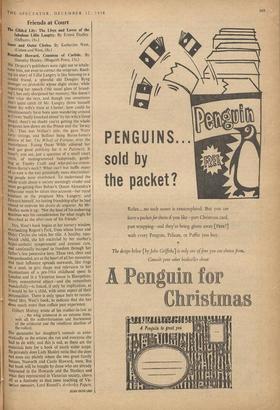Friends at Court
ne Gilded Lily: The Lives and Loves of the fnbtdous Lillie Langtry. By Ernest Dudley. (Odhams, 18s.) Ma. DUDLEY'S publishers were right not to whale- bone him, not even to correct the misprints. Read- ing his story of Lillie Langtry is like listening to a candid friend, a splendid old Douglas Byng dowager en deshabille wbose slight stroke, while impairing her speech (111- usual glass of brand- ing.), has only sharpened her memory. She doesn't care what she says, and though you sometimes don't quite catch (if Mr. Langtry threw himself under his wife's train at Chester, how could he simultaneously have been seen wandering around at Crewe 'badly knocked about' by his wife's hired thugs), there's no doubt you're getting the whole gorgeous low-down on the Prince and the 'Jersey That was Millais's title; she gave Watts forty sittings, and Balfour hung Burne-Jones's Picture a her, The Wheel of Fortune, over the mantelpiece. Young Oscar Wilde admired her (and got good publicity for it in Patience). It Wasn't, you see, just a question of a small court circle, of monogrammed bedspreads, gamb- ling at Tranby Croft and who-put-ice-cream- down-Bertie's-neck? What can't but baffle many of us now is the way potentially more discriminat- ing people went overboard. To understand the Whole truth about a society seemingly cruder and More go-getting than Balzac's, Queen Alexandra's behaviour must be taken into account—her royal kindness to the pregnant Mrs. Langtry; and tdward himself, his lasting friendship after he had ceased to exercise his drafts de seigneur. As Mr. Dudley sums it up: 'Not the least of his endearing qualities was his consideration for what might be described as the after-care of his friends.'
Mrs. West's book begins at her nursery window overlooking Regent's Park, from whose Inner and Outer Circles she takes her title. A healthy, tom- boyish child, she felt encircled by her mother's, hYper-msthetic temperament and anxious care, and continually escaped to freedom through her father's less possessive love. These two, clear and comprehended, are at the heart of all her memories and their influence spreads outwards, like rings on a pool, to give shape and relevance to her recollections of a pre-1914 childhood spent in London and in a Victorian house in Hampshire. Every remembered object—and she remembers Wonderfully—is linked, if only by implication, as It would be for a child, with some aspect of their Personalities. There is only space here to recom- Mend Mrs. West's book, to indicate that she has done much more than collate past experience.
Gilbert Murray wrote of his mother-in-law as . . . the whig aristocrat in an extreme form, with all the authoritarianism and fearlessness of the aristocrat and the rebellious idealism of the radical.
She dominates her daughter's memoir as auto- cratically as the estates she ran and everyone she had to do with; and this its sad, as there are the Materials here for a book of much wider scope. SO privately does Lady Henley write that she does not even say plainly where the two great family houses, .Naworth and Castle Howard, were. But her book will be bought by those who are already interested in the Howards and the Stanleys and What they represented in Victorian society, above all as a footnote to that most touching of Vic- torian memoirs, Lord Russell's Amberley Papers.
JEAN HOWARD






































 Previous page
Previous page